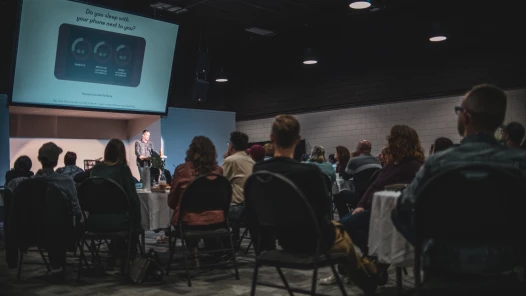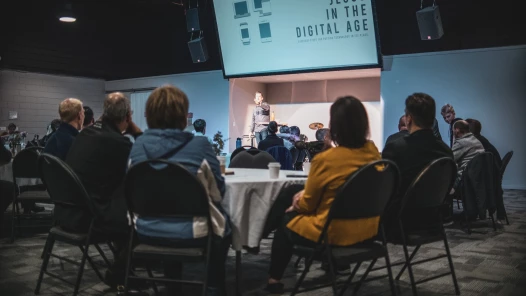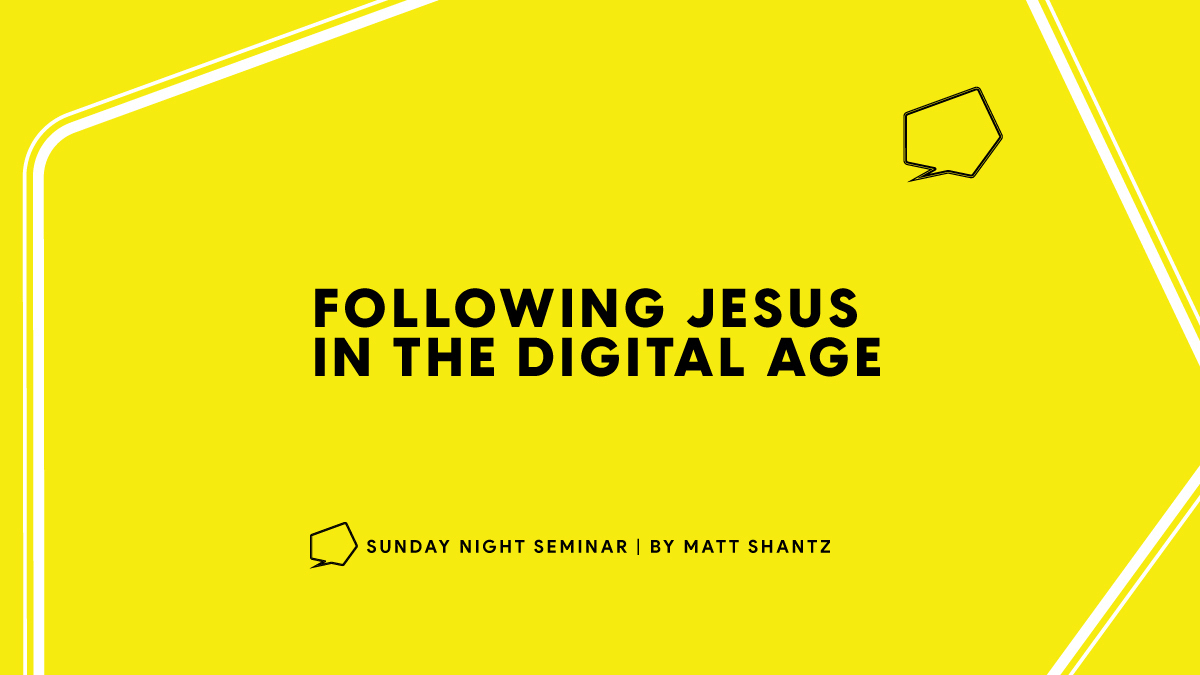As I walked my dog one afternoon recently I was struck by what I saw. In a grassy area in my neighbourhood with two park benches, a couple sat on the one bench both looking down at their phones. A man sat on the other bench doing the same. Beside him, a man pushing his infant in a stroller had stopped and was scrolling through his phone. Beside him was a man in a parked car staring down at his phone. I could see five individuals as I walked by with my dog. All of them were sitting or standing still, looking down at their phones, with only their thumbs moving. It was eery.
This wouldn't have made sense even ten years ago.
So how do we navigate our technological moment as followers of Jesus who prioritize shaping our lives according to the will and ways of Jesus? How do we reclaim real life in a world of devices? What does it look like to follow Jesus in the digital age?
Social Media, Addiction, Anxiety, And Depression
A Harvard research paper describes the dopamine rush that happens in our brains when people like our social media posts. It's very similar to the dopamine rush someone gets when doing cocaine. The most addictive online behaviours have been found to be social media use and online pornography consumption. Like never before, these dopamine rushes happen with little effort, the click of a button onto porn sites or a like or smiley emoji response a post put on Facebook, Twitter, or Instagram. How have we gotten here?!
Here's the problem, social media use and online pornography consumption are leading causes in the rise of anxiety and depression. 20% of those who use social media have social media anxiety disorder. One study found that those who limit their social media consumption to 30 minutes per day experienced less depression and loneliness than those who don't limit their social media use at all.
This isn't a post to say technology is all bad and social media is the devil. Not at all! I do, however, want to advocate for thoughtful consumption rather than being consumed by it.
Culture Creator or Culture Consumer?
In Genesis 1:28 God gave humans born in the Image of God what has come to be known as the "Cultural Mandate". This means that we were created to reflect His glory, have dominion over the earth, and not only multiply but create cultures and civilizations. Far too much of our time today is spent consuming culture. I want to invite you to consume less and create more. You can do this through WRITING A BLOG POST, music, sports, the arts, cooking, writing, architecture, and even accounting! Let's contribute to creating culture, not just consuming culture for the good of our souls, minds, bodies, communities, and world.

One study found that on average Canadians spend 52% of their screen time on their smartphones. As some of the research I've already mentioned has shown, there are dangers here. So here are four ways to build up device restraint:
Building Up Device Restraint
- Turn off unnecessary notifications. Whether it's social media notifications, game notifications, edits to shared calendars, or whatever, the more unnecessary notifications you turn off, the less beeping and buzzing your phone will do, which will lead you to pick up your phone less.
- Be aware of the "flinch". The flinch is any scenario where, out of habit, you reach for your phone to fill the moment. You push your shopping cart up to the back of a lineup and feel the flinch to take out your phone. Your friend gets up from your table at the coffee shop to go use the washroom and you feel the flinch to take out your phone for the 3 minutes they're gone. Be aware of the flinch and fight the urge to fill every spare moment on your phone.
- Delete superfluous apps. Any apps on your phone or tablet that don't add value, delete them. If you've got 40 games on your device, delete 37 of them! If you have 3 or more social media accounts, get rid of the rest and delete the app. This will help you use your device for more primary uses.
- Find things to replace device time. The next time you're bored and want to pull out your phone to just surf around, pick up that book that's been sitting on the coffee table for a year stuck at chapter 3. Get up a make a smoothie or a cup of tea. Go for a walk or strike up a conversation with one or more people in your house and just hang out and be present.

As I said, this isn't a post against technology but instead a post that's advocating for digital wisdom and discernment. In fact, technology can be a great help in supporting your desire to be wise about technology.
Using Technology to Support Wise Use of Technology
- Make use of timer and parameter settings on your devices. Whether it's the Nintendo Switch app or the parental controls on a smartphone, there are a number of settings you can adjust to limit the amount of time the device can be used for or the access it has.
- Utilize WiFi Controls. Devices like KidsWifi (also known as KiWi) and Disney Circle plug in and connect to your household WiFi signal and give you the ability to set parameters around when the WiFi signal is available (eg. 8am-8pm) as well as filtering and monitoring content.
- Use Online Accountability Software on all your devices. Want to avoid accessing inappropriate content online either by accident or on purpose? Want your family members to be restricted from being able to access mature content? Make use of great accountability software like Covenant Eyes (my recommendation) or X3 Watch. Not only does it block sites but it also sends accountability reports to others.

Andy Crouch, in his insightful book, The Tech-Wise Family shared some helpful principles for technology usage.
A Few Categories For Putting Technology In Its Proper Place
- Technology is in its proper place when it helps us bond with the real people we have been given to love.
(It's out of its proper place when we end up bonding with people at a distance, like celebrities, whom we will never meet) - Technology is in its proper place when it starts great conversations.
(It's out of its proper place when it prevents us from talking with and listening to one another) - Technology is in its proper place when it helps us take care of the fragile bodies we inhabit.
(It's out of its proper place when it promises to help us escape the limits and vulnerabilities of those bodies altogether) - Technology is in its proper place when it helps us acquire skill and mastery of domains that are the glory of human culture.
(When we let technology replace the development of skill with passive consumption, something has gone wrong) - Technology is in its proper place when it helps us cultivate awe for the created world we are part of and responsible for stewarding.
(It's out of its proper place when it keeps us from engaging the wild and wonderful natural world with all our senses) - Technology is in its proper place when we use it with intention and care.
(Technology doesn't stay in its proper place on its own. If we're not intentional and careful, we'll end up with quite an extraordinary mess)
The above content and much more was included in our Sunday Night Seminar, entitled, Following Jesus In The Digital Age: Everyday Steps For Putting Technology In Its Place.


